Shandong Cuisine – No. 1 of 8 Great Cuisines of China
Shandong cuisine, originated from Zibo, Shandong, is considered as the No. 1 of 8 great cuisines of China for these reasons: it is the only self-originated cuisine among the 8 major Chinese cuisines while others are influenced by other cuisines more or less; Shandong cuisine history is the longest among all cuisines; it has the most abundant cooking techniques and the most difficult cooking and cutting methods. Most Shandong dishes are umami and moderately salty, sweet and sour dishes are also well-liked. Representative dishes are Sweet and Sour Carp, Braised Sea Cucumber with Scallion, Braised Intestines in Brown Sauce and Braised Prawns in Oil.
Chinese Name: 鲁菜 lǔ cài
English Names: Shandong cuisine, Lu cuisine
Popular in: Shandong, Southern Liaoning
Time of Origin: Spring and Autumn Period (770 - 476 BC)
Flavors: umami, salty, sweet and sour
Famous Shandong Dishes: Sweet and Sour Carp, Braised Sea Cucumber with Scallion, Braised Prawns in Oil
Famous Snacks: Shandong mixed grain pancake, steamed bun
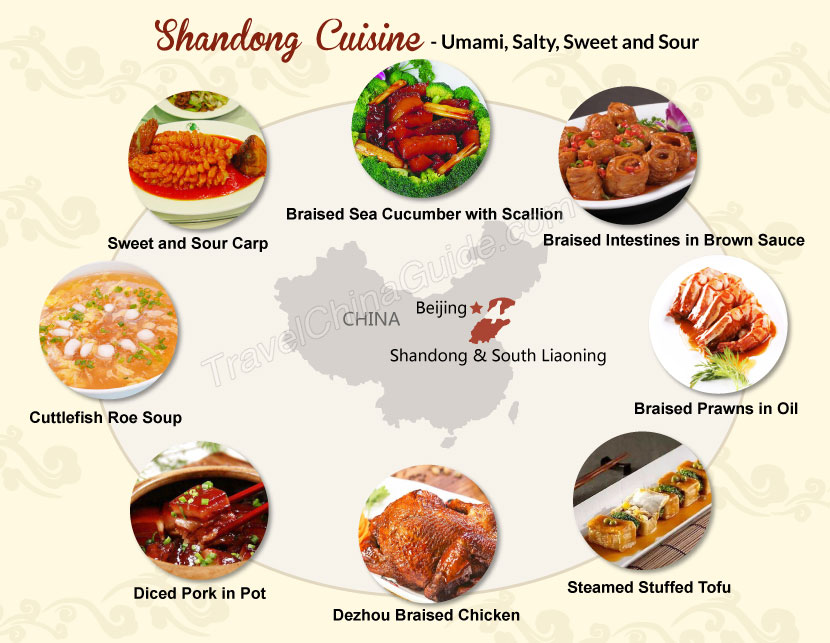 |
History of Shandong Cuisine since 2,500 Years Ago
During the Spring and Autumn Period (770 - 476 BC), Shandong dishes started to show up prominently in the royal court. The main ingredients were cattle, sheep and pigs. In Qin Dynasty (221 - 207 BC) and Han Dynasty (202 BC - 220 AD), the cooking materials became richer. The cooking skills of Shandong cuisine has been greatly developed during the Northern Wei (386 – 534 AD). In Tang Dynasty (618 - 907 AD) and Song Dynasty (420 - 479), the cooking techniques of Shandong food reached a very high standard. In Song Dynasty, a typical branch of Shandong cuisine, Confucianism food or Kong Family Cuisine showed up. In Yuan Dynasty (1271 - 1368 AD), Ming Dynasty (1368 - 1644 AD) and Qing Dynasty (1644 - 1911 AD), Lu cuisine always served the royal court and the official government. With hundreds of years’ development, many special cooking and cutting techniques popped up in Shandong cuisine and many materials were used, which are well inherited by current Lu cuisine chiefs.
Flavors of Shandong Cuisine – Umami, Moderately Salty, Sweet and Sour
The chefs pay attention to the original taste of raw materials. Many dishes like steamed stuffed tofu are lightly seasoned mainly with salt and soup, making dishes taste umami and fresh with a flavorful taste of the original material. Sweet and sour is also a representative flavor of Shandong dishes, like the famous Sweet and Sour Carp, and Sweet and Sour Pork Fillet.
Frequently Used Seasonings: Soup, Scallion, Ginger and Garlic
Soup is the secret seasoning of Lu cuisine. Two types of soup, clear soup and milk white soup, are always applied in cooking. The clear soup is usually made of chicken and duck. The milk white soup is made of greasy meat such as pork knuckle and pig bones. These soups are not eaten directly, but used to freshen dish when cooking as a seasoning. That’s the chefs’ knack to make dishes umami.
Most dishes especially the sea food and meat dishes need to be sautéed with scallion, ginger and garlic to release the strange smell. In addition, when frying, simmering, braising, etc., the green onions is the essential seasoning. Braised Sea Cucumber with Scallion even takes scallion as the main ingredient.
Good at Cooking Sea Food
Exquisite Cutting Skills
The cutting skill of Shandong chefs is second to none. All bones of a whole chicken can be taken out without cutting any pieces off. The slices they cut is extremely thin that you can see the bright light from the other side, and the shreds they cut can be thread into a needle. The cutting skills also give Shandong dishes the appealing appearance.
Special Cooking Techniques: Flash-Frying, Braising, Crisp Frying with Syrup…
The special and outstanding cooking technique is Flash-Frying, called “Bao” in Chinese. The Flash-Frying skills contains frying with oil, frying with sauce, frying with green onion, and frying with soup. The heat is precisely controlled when flash-frying. This cooking method can best keep the original taste of the material.
Another special cooking technique is braising, called “Pa” in Chinese. After preliminary cooked like frying and quick boiling, the raw materials are placed in the big round-bottomed frying pan, and then cooked again. You can see the complete shape of the raw material even after being cooked. The classic dish made by this technique is Dezhou Braised Chicken which the whole chicken is properly retained.
“Ta” is the unique cooking technique of Lu cuisine. The ingredient is marinated and coated with the starch or flour paste, fried until it turns golden, then slowly simmer with the seasonings and prepared soup. By this way, the dish is tasty, tender and umami.
Crisp Frying with Syrup is a Lu cuisine cooking skill for making sweet dish that is followed by other cuisines. The sugar is stir-fried in oil and then melted and turns golden, and then the fried diced ingredient like sweet potato is put into the syrup and stir-fried. The diced sweet potato is coated with crisp and golden syrup and you can see the candied floss when pick up one dice.
Notable Dishes in Shandong Cuisine
Sweet and Sour
Fish
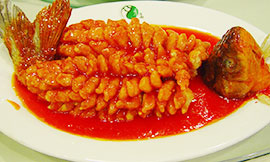
Sweet and sour carp is bright red and tastes sweet, sour and crispy outside. It seems that the carp is splashing higher, which is an auspicious sign in China.
Braised Sea Cucumber with Scallion
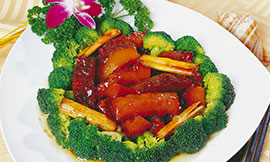
Sea cucumber is one of Shandong specialties. Scallion can effectively help to release the fishy smell of the sea cucumbers and add a special flavor.
Braised Intestines in Brown Sauce
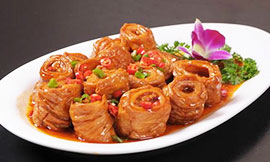
The pork intestine is quick boiled in water, then stuffed with over ten kinds of ingredients and braised with seasonings over low fire. The taste is soft.
Braised Prawns in Oil
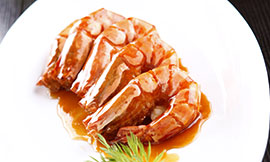
The main ingredients are the large prawns from the Bohai Bay in Shandong. Prawns are stir-fried with seasonings like soy sauce and cooking wine. It tastes fresh, umami, sweet and salty.
Steamed Stuffed Tofu
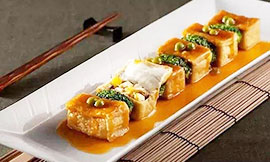
The diced tofu is stuffed with various chopped vegetables and cooked with soup. It is snow white in color and tastes extremely smooth, umami and tender.
Dezhou Braised Chicken
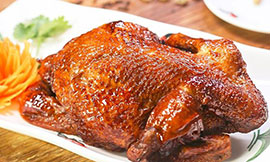
The whole chicken is retained without any bones. The chicken is fried and then braised with various spices. It is tasty and convenient to eat since it has no bones.
10 Famous Shandong Noodles
Shandong Cuisine Menu
| English | Chinese | Pinyin |
|---|---|---|
| Sweet and Sour Carp | 糖醋鲤鱼 | táng cù lǐ yú |
| Braised Sea Cucumber with Scallion | 葱烧海参 | cōng shāo hǎi shēn |
| Braised Intestines in Brown Sauce | 九转大肠 | jiǔ zhuǎn dà cháng |
| Braised Prawns in Oil | 油焖大虾 | yóu mèn dà xiā |
| Steamed Stuffed Tofu | 一品豆腐 | yī pǐn dòu fu |
| Dezhou Braised Chicken | 德州扒鸡 | dé zhōu bā jī |
| Caramel Sweet Potato | 拔丝地瓜 | bá sī dì guā |
| Diced Pork in Pot | 坛子肉 | tán zi ròu |
| Cuttlefish Roe Soup | 乌鱼蛋汤 | wū yú dàn tāng |
| Shark’s Fin Soup with Three Shredded Ingredients | 三丝鱼翅 | sān sī yú chì |
| Omelet Chicken Slices | 芙蓉鸡片 | fú róng jī piàn |
| Stuffed Chicken with Eight-Treasures in Milk Soup | 奶汤八宝布袋鸡 | nǎi tāng bā bǎo bù dài jī |
| Four Joy Meatballs | 四喜丸子 | sì xǐ wán zi |
| Lungs in Milk Soup | 奶汤怠肺 | nǎi tāng dài fèi |
| Stewed Pork Hock | 水晶肘子 | shuǐ jīng zhǒu zi |
| Stir-fried Scalloped Pork Kidneys | 爆炒腰花 | bào chǎo yāo huā |
Best Shandong Cuisine Restaurants in China
![]() Hui Xi'an Lou Restaurant
Hui Xi'an Lou Restaurant
Chinese name: 会仙楼 huì xiān lóu
Address: No.103, Furong Street, Quancheng Square, Lixia District, Jinan![]() Jinagning Restaurant
Jinagning Restaurant
Chinese name: 江宁会馆 jiāng níng huì guǎn
Address: No. 9-10 Pichaiyuan, Jiangning Road, Shinan District, Qingdao![]() Dongxinglou
Dongxinglou
Chinese name: 东兴楼 dōng xìng lóu
Address: No. 25, Tonghu Street, Tongzhou District, Beijing
See more Shandong Restaurants in Beijing![]() Lao Shandong
Lao Shandong
Chinese name: 老山东 lǎo shān dōng
Address: No. 379, Pudong North Road, Pudong New Area, Shanghai
Major Styles of Shandong Cuisine
After long-term development, Lu cuisine gradually formed the middle Shandong style, the east Shandong style represented by Fushan and Qingdao dishes, Jinan style including Dezhou and Tai’an dishes, Confucius cuisine, as well as various local dishes and snacks. Among them, Jinan cuisine is the main part of Shandong cuisine. It is famous for its soup; Confucianism cuisine used to be popular among government officials which is extremely exquisite and gorgeous, representing the high level of Shandong cuisine; east Shandong dishes pay most attention to the raw materials and natural taste and the chefs are good at cooking sea food, and the cutting skills is of high degree.